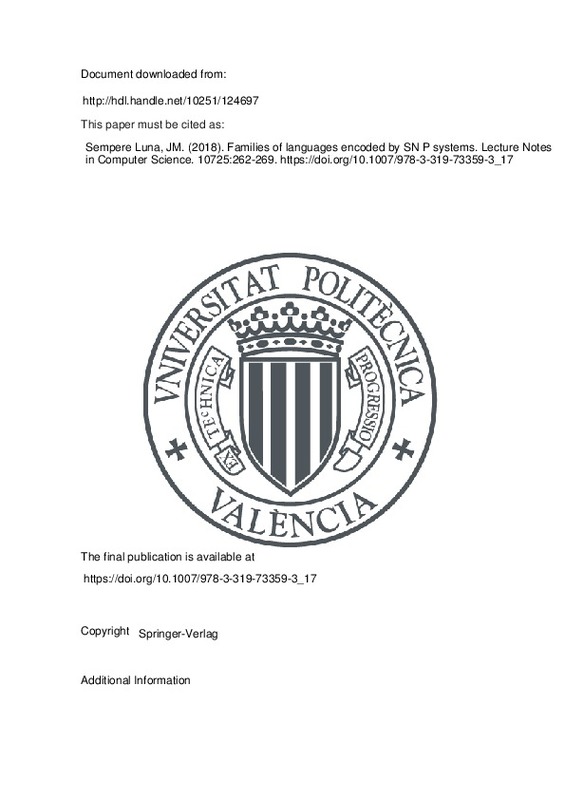Chen, H., Freund, R., Ionescu, M., Păun, G., Pérez-Jiménez, M.J.: On string languages generated by spiking neural P systems. Fundam. Inf. 75(1–4), 141–162 (2007)
Chen, H., Ionescu, M., Păun, A., Păun, G., Popa, B.: On trace languages generated by spiking neural P systems. In: Eighth International Workshop on Descriptional Complexity of Formal Systems (DCFS 2006), Las Cruces, New Mexico, USA, pp. 94–105, 21–23 June 2006
Csuhaj-Varjú, E., Vaszil, G.: On counter machines versus dP automata. In: Alhazov, A., Cojocaru, S., Gheorghe, M., Rogozhin, Y., Rozenberg, G., Salomaa, A. (eds.) CMC 2013. LNCS, vol. 8340, pp. 138–150. Springer, Heidelberg (2014). https://doi.org/10.1007/978-3-642-54239-8_11
[+]
Chen, H., Freund, R., Ionescu, M., Păun, G., Pérez-Jiménez, M.J.: On string languages generated by spiking neural P systems. Fundam. Inf. 75(1–4), 141–162 (2007)
Chen, H., Ionescu, M., Păun, A., Păun, G., Popa, B.: On trace languages generated by spiking neural P systems. In: Eighth International Workshop on Descriptional Complexity of Formal Systems (DCFS 2006), Las Cruces, New Mexico, USA, pp. 94–105, 21–23 June 2006
Csuhaj-Varjú, E., Vaszil, G.: On counter machines versus dP automata. In: Alhazov, A., Cojocaru, S., Gheorghe, M., Rogozhin, Y., Rozenberg, G., Salomaa, A. (eds.) CMC 2013. LNCS, vol. 8340, pp. 138–150. Springer, Heidelberg (2014). https://doi.org/10.1007/978-3-642-54239-8_11
Ibarra, O.H., Leporati, A., Păun, A., Woodworth, S.: Spiking neural P systems. In: Păun, G., Rozenberg, G., Salomaa, A. (eds.) The Oxford Handbook of Membrane Computing, Oxford University Press (2010)
Ionescu, M., Păun, G., Yokomori, T.: Spiking neural P systems. Fundam. Inf. 71(2–3), 279–308 (2006)
Manca, V.: On the generative power of iterated transduction. In: Ito, M., Păun, G., Yu, S. (eds.) Words, Semigroups, and Transductions, pp. 315–327. World Scientific (2001)
Manca, V., Martín-Vide, C., Păun, G.: New computing paradigms suggested by DNA computing: computing by carving. BioSystems 52, 47–54 (1999)
Păun, G.: Membrane Computing. An Introduction. Springer, Heidelberg (2002). https://doi.org/10.1007/978-3-642-56196-2
Păun, G., Pérez-Jiménez, M.J., Rozenberg, G.: Spike trains in spiking neural P systems. Int. J. Found. Comput. Sci. 17(4), 975–1002 (2006)
Rozenberg, G., Salomaa, A. (eds.): Handbook of Formal Languages, vol. 3. Springer, Heidelberg (1997). https://doi.org/10.1007/978-3-642-59136-5
[-]







![[Cerrado]](/themes/UPV/images/candado.png)


